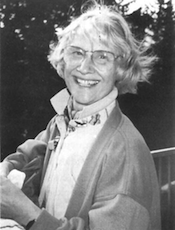The Light of Discovery
Toni Packer
Tuttle: Rutland, Vermont, 1995.
160 pp., $17.95 (cloth).

There is a Zen story about Zen master Ryuge, who, when asked about the state of emptiness, compared it to a thief sneaking into an empty room. A bare room, no furniture, no color, no smell or taste. Plain as a Shaker chair.
Toni Packer’s new book, The Light of Discovery, evokes a similar feeling: dry, bare, devoid of any shadow or liminality. What we have instead is a clear, precise, minutely detailed exposition of the qualities of direct moment-by-moment experience. The landscape of the mind is explored with painstaking detail, flushing out our “constructs,” the “habits” and “filters” that prevent us from the direct experience of each moment:
Pure awareness is the essence of what we truly are. We are not the different states and feelings, moods and tempers succeeding one another. All of it comes and goes lightly, cloudlike, without leaving a trace, when thought doesn’t identify with any of it.
This is the strongest element of Packer’s book: her methodical inquiry into thought and “the direct discovery of what is actually unfolding right now.”
Pursuing this process of discovery, Packer employs a highly discursive, questioning mode to help unravel the knotlike complexities of thought so familiar to meditators:
When you say “I see it but I can’t get out of it,” what is the quality of that seeing? Here is where you really need to look and examine carefully. Is it thinking about your habit-patterns – how long they have persisted, how this is never going to end, wanting to know how to fix it? This is not seeing. This is thinking.
This persistent, questioning tone is very much in the tradition of Krishnamurti, the spiritual teacher whose methods she most clearly embodies. And it is precisely this skeptical questioning, with its reductionism and tediously preachy tone, that eventually becomes wearying. I began to yearn for a metaphor, a simile, an image or a story, some kind of respite from the dry, humorless landscape that the book presents. Strangely enough, perhaps in reaction to this barren style, I began to realize how much I appreciate the rich and varied literature, the complex ritual and art that the various Buddhist traditions have evolved.
And yet, certainly, there is a usefulness and bracing quality in Toni Packer’s approach. She guides us through our tendency constantly to create thoughts and constructs instead of reacting to each new moment. For practitioners who have a strong reaction to devotional practices or difficulty with authority, Toni Packer’s techniques will be of particular appeal:
This is nothing to speculate about, but one can experiment if one is really curious, deeply interested in whether a human being can stand on his or her own without the intervention of, and attachment to, a religious tradition.
In her zeal to remove everything we might attach to, Packer has stripped away most outward signs of authority and hierarchy, and it is here that many American Buddhists will want to listen carefully. For in spite of her resistance to any form of dogma or authority, there is a strong undercurrent of spiritual authority that comes through in her responses to her students. When questioned about the possibility that she is in fact creating a new “something” to attach to, Packer responds:
What you are describing has to be watched with great care: whether we are merely adopting a new vocabulary, a verbal technique, or whether there is clear understanding with direct insight. There’s nothing wrong with using the same vocabulary as Toni or anyone else as long as we are aware that the words we use describing something are not the actual fact.
Clearly, to rid ourselves of attachment to any authority figure and to be free from the tendency to make dogma out of live words is a complex task—not a simple matter of purging our communities of titles and vocabulary. Toni Packer has eliminated almost all the trappings of traditional meditation communities at her practice center, Springwater. Stripped of time periods, standard sitting postures, bows, and conventional interviews, her center is a bold experiment in renouncing religious orthodoxy.
So, has Packer escaped religion? With a community gathered around her at Springwater, even without “student” or “teacher,” some kind of teaching must be going on. Rabbi Zalman Schachter-Shalomi, an old hand at East-West interfaith dialogue, once said that religions are like ice cream: they come in different flavors, strawberry, chocolate, and so on. That being so, Toni Packer’s is nonfat vanilla, but it’s still ice cream.